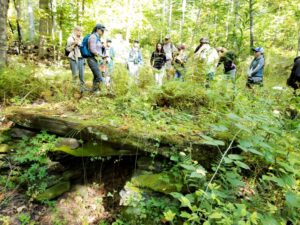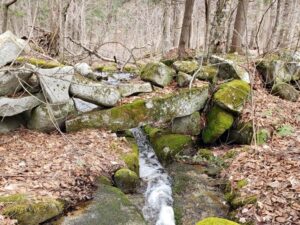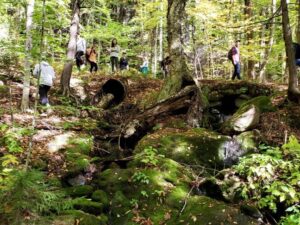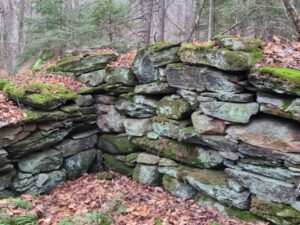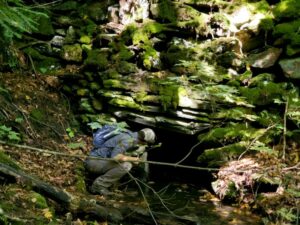History on the Land: Old Forested Farmscapes

Instructor: Samantha Ford
April 27 - 28, 2024 | $285
Course size: 12 students
Financial support available (contact us)
D
iscover how to “read” old forested farmscapes and agricultural architecture to trace 300 years of land use history in Vermont. Stone walls, cellar holes, old roads, and other mysteries “lost” in the woods reveal stories of the families who shaped the landscape as we see it today. Explore a variety of historic landscapes and learn how to recognize the decisions made a hundred years ago and how they’re still visible today. Municipal land records hold a wealth of underutilized primary source information all about our own backyards. Participants embark on a guided tour through the different resources housed in our town halls, and other public resources. These documents can help inform the “why” and the “how” of the patterns visible on the landscape.
Course Goals & Objectives
- Learn about large patterns of European settlement and how they affected the present-day landscape.
- Recognize human patterns on the landscape to peel back layers of prior land use.
- Interpret differences in stone wall building techniques, and the types of land use they define/outline.
- Learn the types of resources available to aid research into the history of prior occupants and their roles within their communities.
About the Instructor
Samantha Ford has more than a decade of experience researching the history of old landscapes in Vermont and Wyoming. In Vermont, Sam has almost two decades of experience working as an Assistant Town Clerk and Deputy Registrar of Vital Statistics, where her love of old records was first discovered. She graduated with her MSc. in Historic Preservation from the University of Vermont in 2013. After graduation Sam headed west to Jackson Hole, Wyoming, where she worked as the Director of Historical Research and Outreach at the Jackson Hole Historical Society and Museum. A staff training for local wildlife guides launched a career in interpreting history for self-identified “non-historians.” Sam has lived and worked in Grand Teton National Park at the historic White Grass Ranch, and currently advises the Teton County Historic Preservation Board. Sam prefers to learn and teach outside, replacing the book stacks of her youth with hardwood forests. She's happiest when others are inspired to share their own personal history with her during walks in the woods. She recently completed the Historic Resource Survey of Boyce Hill for the Town of Fayston.
Physical Requirements
Participants must be able to walk 2-3 miles over the course of each day, sometimes off trail over uneven and potentially muddy terrain. Participants should be comfortable outside in potentially cold, rainy, and/or snowy conditions for long periods of time. Please reach out to us if you have any questions about mobility and/or other accessibility needs.
Recommended Reading
- Sermons in Stone: The Stone Walls of New England and New York by Susan Allport
- Stone by Stone: The Magnificent History in New England's Stone Walls by Robert Thorson
- The Granite Kiss: Traditions and Techniques of Building New England Stone Walls by Kevin Gardner
- Field Guide to New England Barns and Farm Buildings by Thomas Visser
Meals
Participants should bring their own lunches and snacks.
Timing
Course begins 9 AM on Saturday *AT A SITE OF THE INSTRUCTOR'S CHOOSING* to be announced prior to the start of the course. The course concludes by 5 pm. Course begins on Sunday at a time and location of the instructors' choosing and concludes by 5 PM on Sunday.
Academic Credit / Professional Development
This course may qualify for 1 graduate-level credit for an additional $200 course fee. All BioU courses may be accredited by Castleton University. Participants interested in receiving credit must contact us at one month in advance so we have time to arrange course accreditation.
It is the student’s responsibility to ensure that home institutions will accept the credit. Participants pursuing academic credit will be required to complete an additional assignment above and beyond the course hours, including literature review, reflective writing, or a field-based project.
This course qualifies for 20 hours of professional development hours and continuing education units. Certificates of completion are provided at the conclusion of the course.
Cancellation Policy
While we realize that unexpected circumstances arise that are out of our control, North Branch Nature Center cannot guarantee refunds for registrations cancelled within 30 days of the course. If a cancellation occurs within this window, NBNC will attempt to fill the space from our wait list and provide a full refund. If the course needs to be cancelled by NBNC, we will provide a full refund.

713 Elm Street
Montpelier, Vermont 05602
(802) 229-6206
Hours: Center Open Monday-Friday 9-4
Trails Open 24/7

